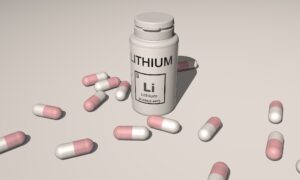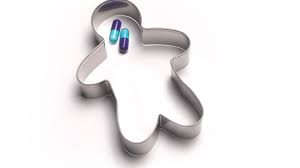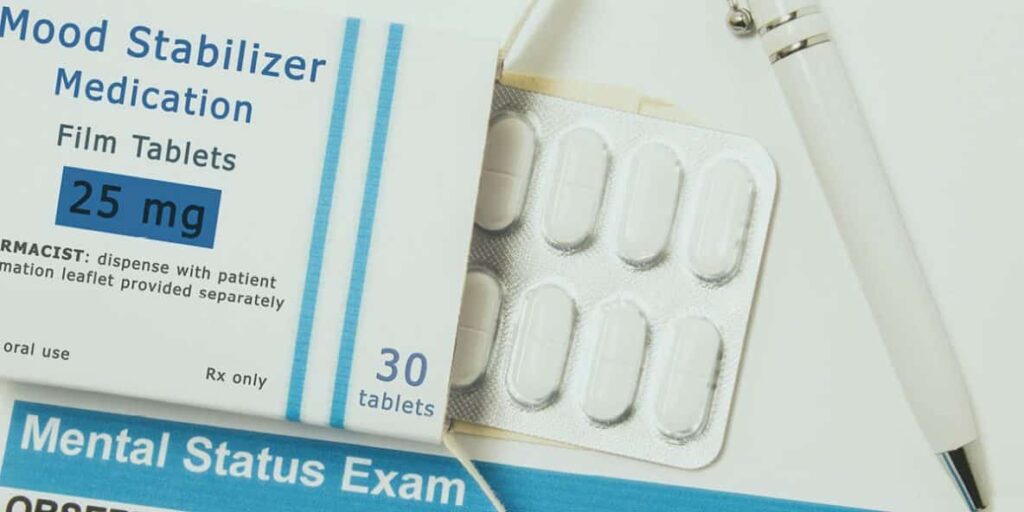Contents
- 1 What Is Lithium?
- 2 What Does Lithium Treat?
- 3 How Long Will It Take Lithium To Work?
- 4 Side Effects of Lithium
- 5 Risks Of Not Taking Lithium As Prescribed
- 6 How Does Lithium Work to Stabilize Moods?
- 7 Risk Associated with Taking Lithium
- 8 Can I Stop Taking Lithium If I Feel Better?
- 9 Who Should Not Take Lithium?
- 10 Who Should Take It?
- 11 What Is the Proper Dosage for Lithium?
- 12 Tips To Remember When Taking Lithium
- 13 Who Should Take Lithium?
- 14 Conclusion
What Is Lithium?

Lithium is a medication used to treat certain mental illnesses, including bipolar disorder. It may be prescribed by a psychiatrist or your general practitioner following the diagnosis of bipolar disorder. It can help prevent mood swings and stabilize moods. Talk with your doctor for more information on how lithium might help you.
Lithium is used to treat manic episodes of bipolar disorder. It may be part of a treatment plan that also includes medications prescribed for you by other doctors, such as an antidepressant or antianxiety medication. This medication won’t cure bipolar disorder, but it can help control symptoms and prevent new manic or depressive episodes from developing
What Does Lithium Treat?
Bipolar disorder is a mental illness that causes mood swings. Lithium can help to prevent mood swings and stabilize moods. It is usually prescribed by a psychiatrist or general practitioner following the diagnosis of bipolar disorder.
Lithium works by balancing out the levels of serotonin and norepinephrine in the brain. This can help to stabilize moods and prevent mood swings.
Symptoms Of Bipolar Disorder It Treats
Bipolar disorder is a mental illness that causes mood swings. The symptoms of bipolar disorder can be very disruptive to your life and can cause a lot of pain. Some of the symptoms of bipolar disorder than lithium may help to treat include:

- Mood swings
- Depression
- Feeling hopeless or helpless
- Feeling irritable or agitated
- Loss of interest in activities you once enjoyed
- having suicidal thoughts or feelings
- Difficulty sleeping or oversleeping
- Feeling tired all the time
- Feeling sad or empty
How Long Will It Take Lithium To Work?
You will likely have to take lithium for several weeks before you notice an effect. It can take time for the medication to build up in your system.
It is very important that you take lithium exactly as your doctor prescribes. Missing doses or not following the instructions can make it less effective over time, and could cause symptoms of bipolar disorder to return.
Side Effects of Lithium
 The most common side effects of lithium are:
The most common side effects of lithium are:
- Dizziness
- Headaches
- Difficulty concentrating or focusing your attention on one task at a time
- Memory problems
These symptoms usually only last a few moments and do not harm you in any way. More serious side effects of lithium include:
- Nausea and vomiting
- Painful muscle cramping or twitching in the hand’s legs, feet, or face
- Changes in your vision, sensitivity to light, or pain in the eyes
You may find that you are more sensitive to sunlight when taking lithium. It is very important that you wear sunscreen and protective clothing when outside for any length of time.
Risks Of Not Taking Lithium As Prescribed
Not taking lithium exactly as prescribed can make it less effective over time. It could also cause symptoms of bipolar disorder to return.
If you stop taking lithium suddenly without talking with your doctor, this could result in an unpleasant withdrawal period where symptoms of bipolar disorder may be worse than before treatment began. If this happens, talk with your doctor right away about slowly reducing the dosage until you feel better again.
How Does Lithium Work to Stabilize Moods?

Lithium works by regulating the amount of serotonin and dopamine in the brain. These two neurotransmitters are responsible for mood stabilization. By increasing the levels of serotonin and dopamine, lithium prevents mood swings from occurring.
It is very difficult to predict how long it will take lithium to be effective. Everyone is different and some people may respond better to lithium than others. Lithium should be taken for at least six months before it is determined whether or not there has been any change to mood stability.
Risk Associated with Taking Lithium
There are some risks associated with taking lithium. The medication can cause dehydration, dizziness, nausea, vomiting, diarrhea, rash, itching, low white blood cell count (which might make it harder for your body to fight off infections), blurred vision, or other eye problems. Talk with your doctor if any of these effects bother you or do not go away.
Lithium does not appear to have any adverse effects on the heart. However, it can cause other serious health risks, such as kidney damage.
- Nausea
- Temporary drowsiness or fatigue
- Frequent urination
- Hand tremors
- Weight gain
Some side effects of lithium include weight gain, hand tremor, thirst, and dry mouth. Talk with your doctor to learn more about the side effects of lithium.
Can I Stop Taking Lithium If I Feel Better?
Do not stop taking your lithium prescription unless your doctor recommends that you do so. It is very important to complete the full length of time prescribed by your doctor, even if you are feeling better. Stopping it suddenly can cause unpleasant withdrawal symptoms where symptoms of bipolar disorder could be worse than before treatment began. If this happens, talk to your doctor right away about slowly reducing the dosage until you feel better again.
You should never stop taking it on your own unless you are instructed to do so by your doctor. If you feel like you no longer need it, make sure to talk with your doctor first before making the decision to stop taking it. Stopping lithium too quickly can cause serious side effects, such as seizures and delusions.
Who Should Not Take Lithium?
People with the following conditions should not take lithium:

- Diabetes
- Heart disease
- Kidney disease
- Severe dehydration
- Mental illness other than bipolar disorder
- Eating disorder
- Addison’s disease
- A weakened immune system
Can Pregnant Women Take It?
There is no evidence that lithium poses any risk to pregnant women or their unborn children. However, it is always important to talk with your doctor before taking any medication during pregnancy.
Who Should Take It?
People who should take lithium include:
- Those suffering from bipolar disorder (manic depression)
- Chronic depressive disorder (dysthymia)
- Some cases of major depressive disorder (unipolar depression) and schizophrenia
What Is the Proper Dosage for Lithium?
It is extremely important to take your medication exactly as prescribed by your doctor. Your doctor will determine the proper dosage based on several factors, including:
- Your age and weight (younger people may need a lower daily dose).
- The severity of any previous manic or depressive episode (a higher dose might be required if you have had more severe episodes in the past).
Tips To Remember When Taking Lithium

Some tips for remembering how to take your lithium prescription include:
- Always check with your doctor before adding any new medications, vitamins, or supplements. This is especially important if you are using over-the-counter cold or flu medication that could lead to dehydration.
- Make sure that you know what foods and drinks should be avoided while on lithium (such as salty food).
- Always check with your doctor before stopping any prescriptions.
- Never stop taking a prescription without first talking with your doctor about the proper way to do so. It is very important that you know what symptoms of bipolar disorder mean it is time to call your doctor.
How Should I Take Lithium?
When taking lithium, it is important to always check with your doctor before starting or stopping any other medications, vitamins, or supplements. It is also important to avoid salty foods and drinks while. Make sure you know what symptoms of bipolar disorder warrant a call to your doctor.
Lithium is usually taken 1-3 times per day with or without food. Swallow the tablet whole and do not crush or chew it. You can take this medicine with or without food but check with your doctor before you take it with milk, fruit juice, coffee, or acidic beverages such as lemonade. Your doctor will tell you when to stop taking this medication and when to start taking it again. It should be taken at the same time each day for the best results.
Who Should Take Lithium?
People who should take lithium include:
- People suffering from bipolar disorder (manic depression)
- Chronic depressive disorder (dysthymia)
- Some cases of major depressive disorder (unipolar depression) and schizophrenia. In addition to these diagnoses, this medication may be prescribed to treat alcohol-related seizures and by doctors who specialize in the treatment of personality disorders.
Conclusion
Lithium is a medication used to treat bipolar disorder. It can help regulate mood swings and manage symptoms of the disorder. It is also sometimes prescribed for people with depression who have not responded to other medications. While it can be effective in treating these conditions, it can also cause side effects like weight gain, tremors, and nausea. If you are taking lithium or are considering starting it, make sure you talk to your doctor about any potential side effects and how they may impact your daily life.
If you are looking for affordable Online Counseling MantraCare can help: Book a trial therapy session


